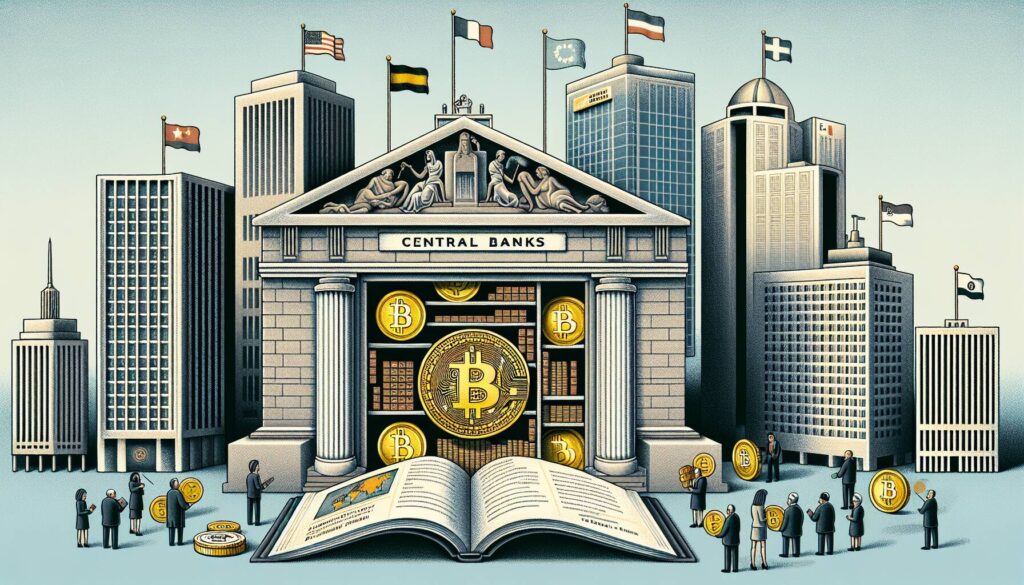In a bold prediction, Deutsche Bank suggests that central banks around the globe may soon start including Bitcoin in their reserves, despite the cryptocurrency being labeled as ‘backed by nothing.’ As traditional financial systems respond to evolving market dynamics, Bitcoin is increasingly viewed as a potential cornerstone of financial security. This development signals a notable shift away from dollar dependence, as central banks diversify their asset portfolios.
According to the recently published insights from Deutsche Bank, both Bitcoin and gold are likely to feature prominently on central bank balance sheets by 2030. This anticipated move underscores a growing recognition of cryptocurrencies within established financial structures, a trend that could redefine concepts of value and stability in the coming years.
“Central banks will end up holding Bitcoin in their reserves even though it is ‘backed by nothing,’” asserts Deutsche Bank, illuminating the broader acceptance of digital currencies in mainstream finance.
The notion of Bitcoin joining the ranks of traditional reserve assets such as gold reflects a transformative moment in the cryptocurrency landscape, as financial institutions increasingly embrace innovative assets in their strategies. As this narrative unfolds, it promises to capture the attention of both investors and analysts alike, highlighting the interplay between traditional finance and the burgeoning world of digital currencies.

Central Banks and Bitcoin: A Shift in Financial Reserves
Key points regarding the potential inclusion of Bitcoin in central bank reserves:
- Prediction of Adoption: Deutsche Bank forecasts that central banks will begin holding Bitcoin as part of their reserves.
- Unconventional Asset: Bitcoin is considered to be ‘backed by nothing,’ yet it may still be perceived as a valuable asset for financial security.
- Shift from Dollar Dependence: There is a growing trend away from reliance on the US dollar, with Bitcoin and gold becoming alternatives for stability.
- Future Reserve Composition: By 2030, both Bitcoin and gold are expected to be featured on central bank balance sheets, indicating a significant shift in asset allocation.
- Implications for Financial Security: The inclusion of Bitcoin in reserves could influence national financial strategies and individual investment choices.
“Bitcoin is ‘almost’ ready to join the big leagues as a central-bank reserve asset.”
Deutsche Bank Predicts Bitcoin’s Rise in Central Bank Reserves
Deutsche Bank’s recent forecasts signal a significant shift in monetary policy, suggesting that central banks may soon be integrating Bitcoin as a reserve asset alongside traditional safe-haven assets like gold. This prediction positions Bitcoin as a potential cornerstone of financial stability, which could redefine how monetary authorities view alternative currencies in a rapidly evolving financial landscape.
Competitive Advantages: The key takeaway from Deutsche Bank’s stance is the growing legitimacy of Bitcoin as a reserve asset. By acknowledging Bitcoin’s potential alongside gold, they emphasize the cryptocurrency’s role in diversifying reserves and mitigating risks associated with dollar dependence. This is particularly advantageous for countries seeking to enhance their financial sovereignty amidst geopolitical tensions and economic uncertainties.
Competitive Disadvantages: However, the endorsement of Bitcoin by central banks may also ignite skepticism among traditionalists who argue that cryptocurrencies are volatile and not “backed by anything.” This perception could hinder broader adoption or lead to regulatory scrutiny. Moreover, Bitcoin’s environmental concerns and transaction speed issues may deter some governments from fully integrating it into their reserve strategies.
Investors who are bullish on digital currencies might find this development beneficial, as increased institutional acceptance could drive Bitcoin prices higher. Conversely, central banks that fail to adapt to this changing landscape may face challenges in maintaining their economic influence. The prospect of Bitcoin on central bank balance sheets could create a competitive edge for nations willing to embrace innovation, while those resistant to change might encounter economic stagnation.

















